高中英语名词考点
高三英语一轮复习语法第1讲名词的数格构词法考点讲义
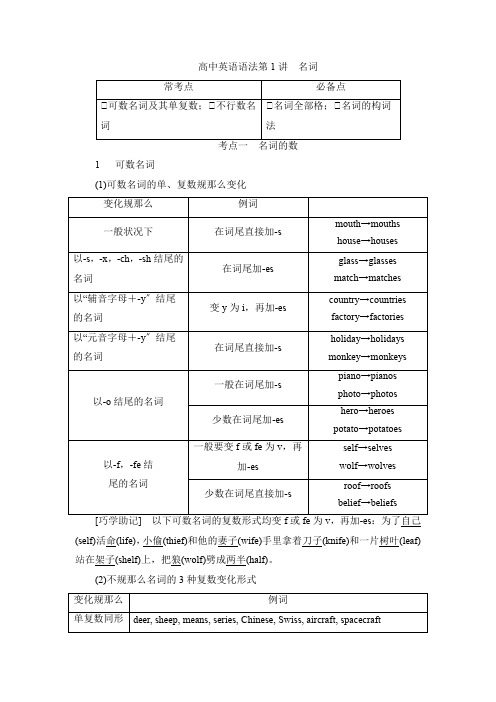
高中英语语法第1讲名词1 可数名词(1)可数名词的单、复数规那么变化:为了自己(self)活命(life),小偷(thief)和他的妻子(wife)手里拿着刀子(knife)和一片树叶(leaf)站在架子(shelf)上,把狼(wolf)劈成两半(half)。
(2)不规那么名词的3种复数变化形式一种鱼时,其单复数形式相同。
(2)people指“人们〞时单复数同形;指“民族〞时,其复数为peoples。
(3)合成名词的2种复数形式①假设有中心词,那么把中心词变成复数;假设无中心词,那么把最终一个词变成复数。
passerby→passersby, sisterinlaw→sistersinlaw, grownup→grownups①“man/woman+n.〞变复数时,作定语的man/woman和中心词都要变复数,如women engineers。
对点练1写出以下名词的复数形式①sheep—sheep①dish—dishes①knife—knives①story—stories①tomato—tomatoes2 不行数名词(1)常见的不行数名词一般来说,物质名词和抽象名词是不行数的,因此没有复数形式,一般也不能用a或an修饰。
通常只用作不行数的名词有:milk, music, homework, housework, weather, news, butter, information, bread, advice, progress, orange(橙汁), meat, equipment, fun, luggage, luck, work(工作), traffic, furniture, wealth, word(消息), room(空间), man(人类)等。
[名师点津]word意为“消息〞、room意为“空间〞、man意为“人类〞时,通常不带任何修饰词。
高中英语词法知识总结-名词篇

一、名词的分类按词汇意义可分为普通名词和专有名词1、普通名词(1)可数名词1)个体名词:用来指单个人或事物的名词,如book 书,gun 枪2)集体名词:用来指一群人或一些事物总称的名词,如people 人民,family 家人(2)不可数名词1)物质名词:用来指无法分为个体的物质、材料的名词,如:air 空气,sang 沙2)抽象名词:用来指人或事物的品质、情感、状态等的名词。
如:peace 和平,anger 怒火2、专有名词用来专门指代某人、某物、某地点、某机构、某组织等的名词,首字母一般要大写。
如:the Changjiang River 长江,WHO 世界卫生组织二、名词的数1、可数名词可数名词指所表示的人或事物可以用数来计算,有单、复数两种形式。
绝大多数可数名词的复数形式通过在词尾加-s或-es构成。
(1)规则变化1)一般在词尾加-s①辅音后读/s/,如:desk-desks/desks/书桌②在元音及浊辅音后读/z/,如:mile-miles/mailz/英里③以/s/,/z/,/dʒ/,/ʃ/,/tʃ/,/ʒ/结尾时读/iz/,如:bridge-bridges/'bridʒiz/桥2)以-s,-x,-sh,-ch结尾的加-es-es一般读作/iz/,如:glass-glasses/'gla:siz/玻璃杯3)以-o结尾的加-s-s一般读作/z/,如:zoo-zoos/zu:z/动物园以o结尾的名词复数加es只有“黑人”“英雄”“喜欢吃”“土豆”“西红柿”:negro,hero,tomato,potato4)以-y结尾的①以辅音字母加-y结尾的词,把-y变成-i,再加-es,-ies一般读作/iz/,如:factory-factories/'fæctəriz/工厂②以元音字母加-y结尾的词直接加-s,-s一般读作/z/,如:way-ways/weiz/方法5)以-f或-fe结尾的词,把-f,-fe变为-v,再加-es,-ves一般读作/vz/,如:wolf-wolves/wulvz/狼;以-f或-fe结尾的,直接加s构成复数的名词则包含在下边的顺口溜中:海湾(gulf)屋顶(roof)悬崖(cliff)上,首领(chief)农奴(serf)两相望,谁说他们无信仰(proof),证据写在手帕(handkerchief)上有些名词可有两种复数形式,如:handkerchief-handkerchiefs/handkerchieves手帕,scarf-scarfs/scarves围巾(2)不规则复数形式1)变内部元音,如:foot-feet/fi:t/脚2)单复数同形的名词,如:sheep绵羊3)外来名词的复数形式,如:criterion-criteria标准,analysis-analyses分析4)同一名词两种复数形式①works表示“工厂”时,单复数同形,但表示“著作”时单数为work,复数为works,如:two works by Mark Twain两部马克②吐温的作品,two chemical works两家化工厂③fish表示鱼的种类时复数形式为fishes,表示条数时复数形式为fish,如:There are many different fishes in this river.这条河中有很多不同种类的鱼。
精选高中英语语法知识点复习—名词(解析版)
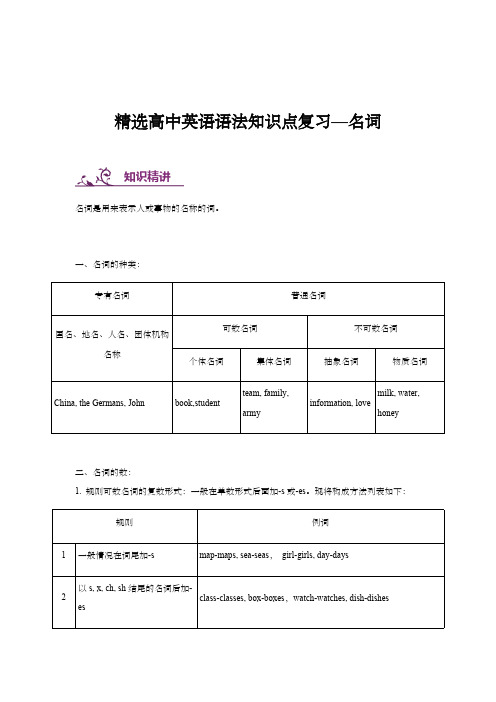
只修饰不可数名词
much, a little, a bit of, a great/good deal of, a great/large/small amount of
既可修饰可数名词又可修饰不可 the, one's, some, any, no, all, a lot of, lots of, plenty of, a large quantity
以辅音字母加 y 结尾的名词,
4
party-parties, family-families, story-stories, city-cities
变 y 为 i 加-es
以元音字母加 y 结尾的名词,
5
toy-toys, boy-boys,day-days, ray-rays, Henry-Henrys
es
变-f 和-fe 为 v 再 leaf-leaves, thief-thieves, knife-knives, wife-wives,wolf-wolves,
以-f 或-fe 加-es 3
结尾的词
half-halves
加-s
chief-chiefs, proof-proofs, roof-roofs
以元音字母加-o 结尾的名词加
7
radio-radios, bamboo-bamboos, zoo-zoos
-s
8 以-th 结尾的名词加-s
trut month-months, path-paths
2. 不规则可数名词复数:
改变名词中的元音字母或
1
man-men, woman-women, foot-feet, goose-geese, mouse-mice
或专有名词以 y 结尾的,加-s
高中英语名词考点

高中英语名词考点在高中英语的学习中,名词是一个重要的语法板块。
掌握好名词的相关考点,对于提升英语语言能力和应对考试都具有重要意义。
接下来,让我们一起深入探讨高中英语名词的常见考点。
一、名词的分类名词可以分为专有名词和普通名词。
专有名词指特定的人、地方、机构等的名称,如 China(中国)、New York(纽约)、Microsoft(微软)等,其首字母通常要大写。
普通名词又可以分为可数名词和不可数名词。
可数名词有单数和复数形式,如 book(书,单数)、books(书,复数)。
而不可数名词没有复数形式,如 water(水)、information(信息)。
二、可数名词的复数形式可数名词的复数形式变化规则多样。
一般情况下,直接在名词后加s,如 cats(猫)、dogs(狗)。
以 s、x、ch、sh 结尾的名词,加 es,如 buses(公共汽车)、boxes(盒子)、watches(手表)、dishes(盘子)。
以辅音字母+ y 结尾的名词,把 y 变为 i 再加 es,如 babies(婴儿)、cities(城市);但以元音字母+y 结尾的名词,直接加s,如 toys(玩具)、days(天)。
以 f 或 fe 结尾的名词,把 f 或 fe 变为 v再加 es,如 leaves(树叶)、knives(刀);但有些词直接加 s,如roofs(屋顶)。
还有一些不规则的名词复数形式需要特别记忆,如 man men(男人)、woman women(女人)、child children(孩子)、foot feet (脚)、tooth teeth(牙齿)等。
三、不可数名词的量化不可数名词不能用具体的数字来表示数量,但可以借助一些量词来量化。
常见的量词有piece(片、块、件)、bottle(瓶)、cup(杯)、glass(玻璃杯)、bag(袋)等。
例如,a piece of paper(一张纸)、a bottle of water(一瓶水)、two cups of coffee(两杯咖啡)。
高中英语语法知识点归纳名词总结

高中英语语法知识点归纳名词总结一、名词的基本概念和分类名词是表示人、事物、地方或抽象概念的词语。
根据名词的不同特征和功能,可以分为以下几类:1.具体名词:用来表示可以看、摸、听、嗅、尝等的人、事物。
例如:book(书)、desk(桌子)、cat(猫)等。
2.抽象名词:用来表示观念、情感、状态或活动等无法直接感知的东西。
例如:love(爱)、happiness(幸福)、freedom(自由)等。
3.集体名词:用来表示由一类人、事物组成的整体。
例如:team(队伍)、family(家庭)、audience(观众)等。
4.专有名词:用来表示特定的人、事物或地点,需要首字母大写。
例如:China(中国)、Beijing(北京)、John(约翰)等。
5.数量名词:用来表示不可数名词或可数名词的复数形式。
例如:water(水)、books(书籍)等。
6.可数名词:用来表示具体事物或可单独计数的事物。
可分为单数名词和复数名词。
例如:dog(狗)、dogs(狗们)等。
二、名词的单复数形式1.单数名词:表示一个事物。
大多数名词直接加s形成复数。
例如:dog(狗)→dogs(狗们)。
2.以s、x、sh、ch结尾的名词,复数形式一般在词尾加es。
例如:class(班级)→classes(班级们)。
3.以辅音字母+y结尾的名词,将y变为i,再加es形成复数。
例如:party(派对)→parties(派对们)。
4.以元音字母+y结尾的名词,直接加s形成复数。
例如:day(日子)→days(日子们)。
5.以f或fe结尾的名词,复数形式一般将f或fe变为v,再加es。
例如:leaf(叶子)→leaves(叶子们)。
6.一些名词的复数形式不规则,需要记忆。
例如:man(男人)→men(男人们)、child(孩子)→children(孩子们)等。
三、名词的所有格形式名词的所有格形式表示所有关系或所属关系。
在名词后面加上's或'即可形成名词所有格。
高中英语考试中的高频考点100个

英语考试中的高频考点100个1.名词的单复数规则变化+s/es、不规则变化(mouse-mice)、单复数同形、同一词在不同意义下有可能可数有可能不可数2.名词所有格’s(表示有生命:Lily’s desk)、of所有格(表示无生命the window of the room)3.名词修饰语只修饰可数名词(each、every、a great many)、只修饰不可数名词(little、a little、alarge amount of)、都可以修饰(some、alot of、plenty of)4.不定冠词(a/an单数不特指);定冠词(the/this/that/these/those表特定)5.such的用法such作限定词和all,no,any,some,other,anther等词连用时,such放后面。
如果such修饰单数可数名词,且与不定冠词连用时需置于其前;such前有no时不用冠词。
6.so的用法在believe,think,expect,suppose等词后用so代替前文提出的观点在肯定句中表示与上文相同的情况,如:So do I.7.all和both的用法all三者或三者以上全部都,both二者都。
all指整体或抽象事物时当做单数,指人时当做复数。
both做主语时,谓语动词用复数。
8.many修饰或替代可数名词,much修饰或替代不可数名词many a 许多(谓语动词用单数)a good/greatmany很多as many as/asmuch as一样多、差不多9.little几乎没有,修饰不可数名词a little有一点,修饰不可数名词few几乎没有,修饰可数名词a few有一点,修饰可数名词10.形容词比较级最高级原级比较:…is as good asmine.表示少于或超过另一方:fewer than, morethan易混淆短语:as well as也…既…as far as就…而言11.比较级常见错误:用much表强调时的误用She looks moreyounger than I.(×)She looks muchyounger than I.(√)12.介词短语重点except for除了in place of代替on behalf of代表but for要不是in front of在…前面13.介词across,over,through,past四个常考介词的区别across横穿穿越,发生在物体表面over跨过越过,发生在物体上方through穿过,发生在某物空间内past从旁经过14.易混淆的介词短语in all总共after all毕竟at all根本,常用在否定句中表强调above all最重要的是,尤其是15.序数词前一定要加定冠词the,改错常考,序数词与基数词连用时,序数词放在前面,如the first one。
高中英语语法名词归纳总结
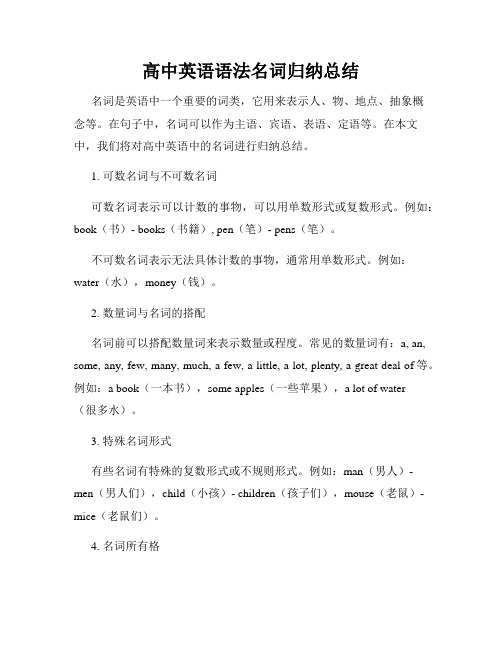
高中英语语法名词归纳总结名词是英语中一个重要的词类,它用来表示人、物、地点、抽象概念等。
在句子中,名词可以作为主语、宾语、表语、定语等。
在本文中,我们将对高中英语中的名词进行归纳总结。
1. 可数名词与不可数名词可数名词表示可以计数的事物,可以用单数形式或复数形式。
例如:book(书)- books(书籍), pen(笔)- pens(笔)。
不可数名词表示无法具体计数的事物,通常用单数形式。
例如:water(水),money(钱)。
2. 数量词与名词的搭配名词前可以搭配数量词来表示数量或程度。
常见的数量词有:a, an, some, any, few, many, much, a few, a little, a lot, plenty, a great deal of等。
例如:a book(一本书),some apples(一些苹果),a lot of water(很多水)。
3. 特殊名词形式有些名词有特殊的复数形式或不规则形式。
例如:man(男人)- men(男人们),child(小孩)- children(孩子们),mouse(老鼠)- mice(老鼠们)。
4. 名词所有格名词所有格表示所属关系,一般在名词后加's表示。
如果名词已经是复数形式,只需要在名词后加'。
例如:Tom's book(汤姆的书),the students' bags(学生们的书包)。
5. 特殊名词搭配有些名词是固定搭配,需要特别注意。
例如:a piece of cake(一块蛋糕),a cup of tea(一杯茶),a pair of shoes(一双鞋)。
6. 名词作为不同句子成分名词可以在句子中扮演不同的角色,如主语、宾语、表语、定语等。
(1)名词作为主语:A book is on the table.(一本书在桌子上。
)(2)名词作为宾语:I like apples.(我喜欢苹果。
高中英语2024届高考复习名词汇总

高中英语名词tendency 倾向,偏好,性情performer 表演者,执行者compass 罗盘,指南针earth 地球;土,泥;大地moon 月球;月光;月状物field 田地;牧场;场地tour 参观,观光,旅行waiter (餐厅)男服务员quilt 被子category 类别,种类whistle 口哨,口哨声cousin 堂(表)兄弟,堂(表)姐妹physicist 物理学家parrot 鹦鹉workforce 劳动力intelligence 智力,才智,智慧universe 宇宙currency 货币;现金advice 忠告,劝告,建议riddle 谜语gale 强风lot 许多,好些vase (花)瓶;瓶饰towel 毛巾doll 玩偶,玩具娃娃snack 小吃war 战争garlic 大蒜research 调查,研究junk (口语)废品,破烂货adolescent 青少年agent 代理人,经纪人pole 杆,电线杆chemist 药剂师;化学家ankle 踝,踝关节luck 运气,好运tax 税,税款minority 少数;少数民族trousers 裤子,长裤beehive 蜂箱income 收入,所得studio 工作室,演播室tin (英)罐头,听头snowball 雪球hen 母鸡directory 姓名地址录affection 喜爱,钟爱dam 水坝,堰堤carrot 胡萝卜midday 中午,正午behaviour行为,举止gate 大门tobacco 烟草,烟叶origin 起源,由来shelter 掩蔽;隐蔽处preference 选择,趋向departure 离开,启程ambition 目标,野心,雄心,报复fact 事实,现实weather 天气drum 鼓requirement 需要;需求;必要的条件medal 奖牌ocean 海洋snowman 雪人sky 天;天空assumption 假定,假设postage 邮费bottom 底部;底beer 啤酒signal 信号,暗号roof 屋顶,顶部emperor 皇帝astronaut 宇航员disease 疾病,疾chair 椅子grocer 零售商人;食品店ministry (政府的)部car 小汽车,小卧车production 生产;制造software 软件beast 野兽;牲畜sale 卖,出售trick 诡计,把戏flower 花parcel 包裹overcoat 大衣hospital 医院acquisition 获得,得到heroine 女英雄,女主角spaceship 宇宙飞船identity 身份,持证nurse 护士;保育员psychology 心理学percentage 百分率latter (两者之中的)后者sorrow 悲伤,悲痛apple 苹果zone 区域;范围pair 一双,一对beam 平衡木birth 出生;诞生child 孩子,儿童grain 谷物,谷类bookcase 书橱outcome 结果,效果skin 皮,皮肤;兽皮union 联合,联盟;工会taxi 出租汽车winner 获胜者phenomenon 现象habit 习惯,习性government 政府shark 鲨鱼suite 套件;组曲size 尺寸,大小list 一览表,清单university 大学hearing 听力liberty 自由earthquake 地震athletics 田径generation 代,一代agreement 同意,一致;协定,协议dialogue 对话dignity 庄重,庄严,尊严,尊贵,高尚windbreaker 风衣,防风夹克mosquito 蚊子victory 胜利diary 日记;日记簿brain 脑inventor 发明者,创造者evolution 进化,演变friendship 友谊,友情homework 家庭作业pool 关系;亲属cloth 布elephant 象aircraft 飞机crime (法律上的)罪,犯罪greeting 祝贺connection 连接物;接触,联系motor 发动机,马达security 安全,平安oxygen 氧;氧气locust 蝗虫bike 自行车friend 朋友jungle 丛林,密林chest 箱子;盒子;胸部dirt 污物;脏污plane 飞机globe 地球仪,地球cattle 牛,家畜building 建造物;房屋;大楼finance 资金,财政,财务stocking 长筒袜heel 脚后跟file 公文柜;档案文档chairman 主席,会长;议长textbook 课本,教科书crop 庄稼;收成T-shirt T恤衫chocolate 巧克力relief 轻松,解脱,缓和,救济crew 全体船员job 工作man 成年男人;人类art 艺术,美术;技艺data 资料,数据unrest 不安;骚动criminal 罪犯perfume 香水drink 饮料;喝酒journalist 记者,新闻工作者examination 考查;考试;审讯;检查group 组,群burden (义务,责任的)重担,负担rank 职衔,军衔situation 形势,情况courage 勇气;胆略manner 方式,态度,举止family 家庭;家族;子女monitor (班级内的)班长;纠察生;监视器rat 老鼠biochemistry 生物化学least 最少,最少量gentleman 绅士,先生;有身份、有教养的人monkey 猴子stadium (露天)体育场blood 血,血液composition 作文;作曲policy 政策,方针,原则beauty 美丽,美人league 联盟,社团value 价值,益处education 教育,培养discrimination 歧视grandson (外)孙子pan 平底锅dozen 十二个;几十,许多jewelry 珠宝coach 教练;马车;长途车tape 磁带;录音带chaos 混乱,杂乱,紊乱embassy 大使馆sunset 日落(时分)scientist 科学家owner 物主,所有人skateboard 冰鞋,滑板prayer 祈祷poem 诗voice 说话声;语态receipt 收据zipper 拉链grass 草;草场;牧草flame 火焰,光辉burglar 入室窃贼advantage 优点;好处factory 工厂dog 够immigration 移民viewer 观看者card 卡片;名片;纸牌quantity 量,数company 公司customer (商店)顾客,主顾wedding 婚礼,结婚exchange 交换,掉换;交流temptation 引诱;诱惑mercy 怜悯ability 能力;才能starvation 饥饿;饿死northwest 西北wing 机翼,翅膀capsule 胶囊condition 条件,状况rainbow 虹,彩虹chain 链;链条religion 宗教peace 和平bathrobe 浴衣mist 雾eraser 橡皮擦;黑板擦office 办公室desk 书桌,写字台cushion 垫子golf 高尔夫球bunch 串,束,扎,大量,大批consideration 考虑;关心turkey 火鸡delight 快乐;乐事basket 篮子disappointment 失望;沮丧fiction 小说,虚构的事questionnaire 调查表,问卷herb 草药description 描述,描写baby 婴儿printing 印刷,印刷术room 房间,室;空间;地方ground 地面balcony 阳台;楼座brick 砖;砖块homeland 祖国window 窗户;计算机的窗tent 主题theme 主roller 滚筒grandfather (外)祖父hostess 女主人request 请求,要求的事物glass 玻璃杯,玻璃;眼镜pillow 枕头clerk 书记员;办事员;职员century 世纪,百年band 乐队audience 观众,听众future 将来juice 汁、液museum 博物馆,博物院boating 划船,泛舟understanding 领会;理解bird 鸟patience 容忍;耐心lesson 课;功课;教训highway 公路,主要交通道路necklace 项链bank 岸,堤;银行responsibility 责任,负责apron (机场的)停机坪gift 赠品;礼物piece 一块(片,张,件)skill 技能,技巧commitment 承诺,允诺,承担motivation (做事的)动机adventure 冒险;奇遇fun 有趣的事,娱乐,玩笑bed 床fur 毛皮;皮子grandpa 爷爷,外公theory 理论growth 生长,增长paragraph (文章的)段落kitchen 厨房academy 专科学院,私立学校gallery 画廊;美术品陈列室specialist (医学)专家,专科医生;专家;专业人员text 文本,课本educator 教育家determination 决心forest 森林baggage 行李mankind 人类;人orbit 运行轨道jar 坛子;罐子telescope 望远镜camel 骆驼boundary 边界,界限airline 航空公司;航空系统discount 折扣protection 保护gun 枪,炮side 边,旁边,面,侧面stairs 楼梯mat 垫子experience 经验;经历rose 玫瑰花welfare 幸福,福利pie 甜馅饼gardening 园艺学flashlight 手电architecture 建筑学,建筑设计,风格people 人,人们;人民attraction 吸引,爱慕dentist 牙科医生symptom 症状vehicle 交通工具,车辆opinion 看法,见解squid 鱿鱼remark 陈述;话;议论pioneer 先锋,开拓者appreciation 欣赏,鉴定,评估concert 音乐会;演奏会idea 主意,意见,打算,想法thunderstorm 雷电交加,暴风雨nylon 尼龙punishment 惩罚ballet 芭蕾舞spirit 精神team 队,组anecdote 轶事,趣闻ash 灰;灰末administration 管理,行政部门parent 父母,双亲stranger 陌生人,外人pest 害虫dish 盘,碟;盘装菜chef 厨师长,主厨applicant 申请人box 盒子,箱子nut 坚果,果仁(胡桃,栗子等)fluency (外语)流利,流畅conference (正式的)会议;讨论outline 概述,略述tennis 网球sweater 厚运动衫,毛衣collar 衣领;硬领gas 煤气ceremony 典礼,仪式,礼节drug 药,药品;毒品aunt 伯母;舅母;姑;婶;姨strawberry 草莓warehouse 仓库,货栈difficulty 困难,费力cow 母牛,奶牛tap 龙头attention 注意,关心symphony 交响乐math 数学valley 山谷,溪谷Buddhism 佛教mass 众多;大量;群众skyscraper 摩天楼lab 实验室heaven 天,天空hotel 旅馆,饭店,宾馆receiver 电话听筒son 儿子warmth 暖和,温暖bakery 面包店rubber 橡胶;合成橡胶smoker 吸烟者interval 间歇;间隔cathedral 大教堂(天主教)movie (口语)电影popcorn 爆米花communism 共产主义club 俱乐部;纸牌中的梅花nail 钉;钉子border 边缘;边境,国界hill 小山;丘陵;土堆;斜坡conversation 谈话,交谈bag 书包;提包;袋子elder 长者;前辈peasant 农民;佃农house 房子;住宅fall (美)秋季daughter 女儿sandwich 三明治assistant 助手,助理idiom 习语,成语purse 钱包winter 冬天,冬季market 市场,集市broadcast 广播节目works 著作,作品justice 正义;公正;司法story 故事,小说jam 果酱;阻塞flu 流行性感冒opera 歌剧page 页码assistance 帮助,援助,支持shopkeeper 店主,零售商人tube 管,管状物grape 葡萄patent 专利权,专利证书stamp 邮票blackboard 黑板shelf 架子;搁板,格层;礁;陆架dinosaur 恐龙founding 成立,建立vest 内衣,背心breath 气息;呼吸quarter 四分之一,一刻钟bowling 保龄球cube 立方体person 人librarian 图书管理员;(西方的)的图书馆馆长temperature 温度belief 信条,信念event 事件,大事keeper (动物园中的)饲养员,看守人pressure 压迫,压力,压强cottage (郊外)小屋,村舍,别墅passage (文章中的)一节,一段;通道;走廊tail (动物的)尾巴burial 埋葬housework 家务劳动network 网络,网状系统tourist 旅行者,观光者pronunciation 发音suitcase (旅行用)小提箱,衣箱drawer 抽屉violence 暴力行为headmaster (英)中小学校长key 钥匙;答案;键;关键fault 缺点,毛病slave 奴隶lightning 闪电country 国家;农村,乡下carpenter 木工,木匠path 小道,小径writing 书写,写lid 盖子occupation 职业,工作graduation 毕业,毕业典礼dioxide 二氧化物birthplace 出生地,故乡appearance cigarette 纸烟,香烟playground 操场,运动场lounge 休息厅;休息室spelling 拼写,拼读underwear 内衣province 省surplus 过剩,剩余cat 猫irrigation 灌溉battleground 战场appearance 出现,露面;容貌breast 乳房,胸脯ice 冰artist 艺术家frontier 前沿,边界;前线reservation 预定environment 环境sentence 句子lawyer 律师sleep 睡觉beard (下巴上的)胡须heart 心,心脏,纸牌中的红桃pride 自豪,骄傲cock 公鸡engineer 工程师;技师cocoa 可可粉spring 春天,春季;泉水,泉abortion 人工流产,堕胎meaning 意思,含义kid 小孩ladder 梯子pea 豌豆shower 阵雨;淋浴fantasy 幻想,梦想eggplant 茄子prisoner 囚犯mailbox 邮筒;邮箱comfort 安慰;慰问entry 进入stair 楼梯party 聚会,晚会;党派movement 运动,活动courtyard 庭院,院子safety 安全,保险buffet 自助餐death 死profession 职业(如律师或医生)chairwoman 女主席,女会长;女议长procedure 程序,手续,待遇glove 手套agenda (会议)议程表,议事日程motto 箴言,格言revolution 革命,变革permission 允许,许可,同意cooker 炊具(锅、炉灶、烤炉等)technique 技术;技巧,方法cuisine 饭菜,佳肴silk (蚕)丝,丝织品watermelon 西瓜possession 所有,拥有;财产,所有物distance 距离virtue 美德,正直的品行,德行topic 题目,话题reputation 名声,名誉speech 演讲madam 夫人,女士organization 组织,机构balloon 气球college 学院;专科院校account 账目;描述envelope 信封difference 不同dormitory 学生宿舍nursery 托儿所airport 航空站,飞机场ambulance 救护车adult 成年人claw 爪strait 海峡comedy 喜剧lady 女士,夫人shoe 鞋soap 肥皂gym 体操;体育馆;健身房beginning 开始,开端cell (监狱的)单人牢房;(修道院的)单人小室;(蜂巢的)小蜂窝;生物细胞crossroads 交叉路口soil 土壤,土地ownership 所有制brunch 早午饭cigar 雪茄烟collection 收藏品,收集物competence 能力,胜任,管辖权example 例子,榜样certificate 证明,证明书stone 石头,石料component 组成部分,部件bee 蜜蜂lifetime 一生,终生port 港口,码头marble 大理石;玻璃弹子animal 动物diagram 图表,图样bandage 绷带hay 做饲料用的干草thermos 热水瓶screen 幕,荧光屏printer 打印机。
高中英语(名词)
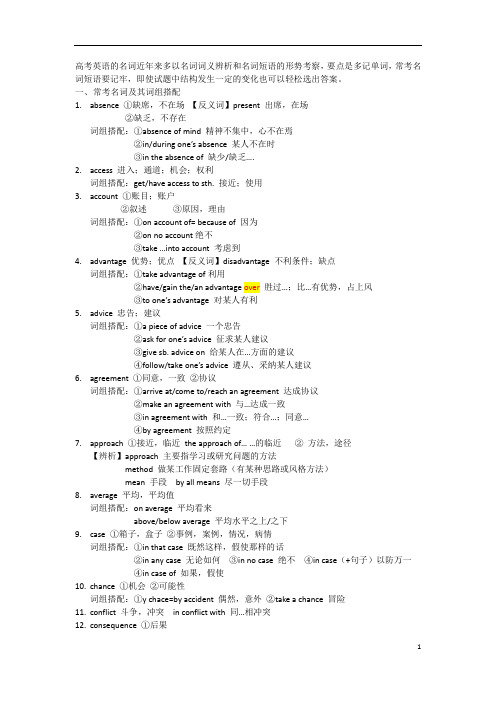
高考英语的名词近年来多以名词词义辨析和名词短语的形势考察,要点是多记单词,常考名词短语要记牢,即使试题中结构发生一定的变化也可以轻松选出答案。
一、常考名词及其词组搭配1.absence ①缺席,不在场【反义词】present 出席,在场②缺乏,不存在词组搭配:①absence of mind 精神不集中,心不在焉②in/during one’s absence 某人不在时③in the absence of 缺少/缺乏….2.access 进入;通道;机会;权利词组搭配:get/have access to sth. 接近;使用3.account ①账目;账户②叙述③原因,理由词组搭配:①on account of= because of 因为②on no account绝不③take …into account 考虑到4.advantage 优势;优点【反义词】disadvantage 不利条件;缺点词组搭配:①take advantage of利用②have/gain the/an advantage over胜过…;比…有优势,占上风③to one’s advantage 对某人有利5.advice 忠告;建议词组搭配:①a piece of advice 一个忠告②ask for one’s advice 征求某人建议③give sb. advice on 给某人在…方面的建议④follow/take one’s advice 遵从、采纳某人建议6.agreement ①同意,一致②协议词组搭配:①arrive at/come to/reach an agreement 达成协议②make an agreement with 与…达成一致③in agreement with 和…一致;符合…;同意…④by agreement 按照约定7.approach ①接近,临近the approach of……的临近②方法,途径【辨析】approach 主要指学习或研究问题的方法method 做某工作固定套路(有某种思路或风格方法)mean 手段by all means 尽一切手段8.average 平均,平均值词组搭配:on average 平均看来above/below average 平均水平之上/之下9.case ①箱子,盒子②事例,案例,情况,病情词组搭配:①in that case 既然这样,假使那样的话②in any case 无论如何③in no case 绝不④in case(+句子)以防万一④in case of 如果,假使10.chance ①机会②可能性词组搭配:①y chace=by accident 偶然,意外②take a chance 冒险11.conflict 斗争,冲突in conflict with 同…相冲突12.consequence ①后果②重要性,价值He is a man of great consequence 他是一个很重要的人物词组搭配:①in consequence =as a consequence 结果,因此②in consequence of=as a consequence of…因为,由于…13.convenience 方便,便利at one’s convenience 在某人方便时14.damage 毁坏,损失词组搭配:①cause damage to sth. 损坏某物②repair the damage 修复损失15.demand 需求in demand 有需求,需求大16.doubt 怀疑,疑问词组搭配:①There’s no doubt that 从句毫无疑问②in doubt 怀疑,不能肯定③without doubt 毫无疑问17.effect 效果;影响词组搭配:①have an effect on sb. 对某人有影响②put/bring…into effect 使生效/实施③come into effect 生效④take effect 见效18.effort 努力①make an/every effort to do 尽力做…②spare no effort 不遗余力19.exchange 交换;互换in exchange for sth. 作为对某物的交换20.favor ①赞同,支持②帮助,恩惠词组搭配:①do sb. a favor 给某人帮忙②in favor of 支持,赞成,有利于21.fun①娱乐②玩笑词组搭配:①have fun doing sth. 做某事感到高兴②make fun of sb 取笑某人③It’s fun to do 做…真有趣④for fun 为了消遣22.hand ①手②(钟表的)指针③帮助词组搭配:①by hand 用手,手工②at hand 即将到来;在附近③give/land sb.a hand 给某人帮助23.instant 瞬间,片刻the instant=instantly 一…就…;引导时间状语24.moment ①一会儿,片刻after a moment 过了一会儿②时间,时刻at the moment词组搭配:①the moment = as soon as 一…就…②for the moment 暂时,目前25.need ①in need of…需要…②in need 在贫困之中,在困难之时26.place ①地方,地点②身份,地位③位置④名次词组搭配:①take place 发生②take one’s place =take the place of 代替,顶替③in place of 代替④in place 在正确的位置⑤out of place 不适当27.point①尖端②点,小数点③要点,论点④分数,得分⑤意义⑥时刻⑦地点,某地方词组搭配:①on the point of 正要做…②to the point 切题,扼要③off the point 离题④There’s no point in doing sth. 做某事没意义28.possession ①拥有;具有②(常用复数)个人财产,私人物品词组搭配:①in possession of sth. 拥有,占有某物②in sb’s possession 为某人所拥有29.quantity ①数量,量②大量,大批(in quantity)常考主谓一致:①quantities of + n. 做主语时,谓语动词用复数形式②a large quantity of +n. 做主语时,谓语动词根据名词确定30.reach ①v.达到②n.伸手可及的距离词组搭配:①out of reach 无法取得联系②within the reach of sb.=within one’s reach 某人能触及的范围③beyond one’s reach=out of one’s reach 超出某人的能力范围31.relief ①宽慰,宽心②(痛苦或不快的)减轻,缓解词组搭配:to one’s relief 令某人宽慰的是32.request 要求,请求词组搭配:at one’s request 应某人的要求;that 从句常用虚拟语气33.return 回来,返回词组搭配: a return trip 返程;in return for 作为对…的回报34.sense ①感官,感觉②判断力;见识③含义;意义词组搭配:①in a sense 在某种意义上②make sense讲得通,有意义③make sense of 弄明白,理解35.sight ①视力②视力范围,视野③景象,情景词组搭配:①lose one’s sight 失明②catch sight of 发现③in/within sight 在视野内,看得见④out of sight 看不见⑤come into sight 出现(在视野中)36.stage ①舞台②时期;阶段词组搭配:①go on the stage 当演员,登台演出②set the stage for 为…做准备= prepare for③stage by stage 逐步地,循序渐进地=gradually37.strength ①力量,力气②实力,优势38.supply ①供应量②补给,补给品(常用复数)词组搭配:be in short supply 供应不足supplies of 许多的=quantities of=many=lots of=plenty of39.surprise ①惊奇,诧异②令人惊奇的事词组搭配:①in surprise=surprisingly惊奇地②to one’s surprise 令某人吃惊的是③take…by surprise 出其不意地抓获;突袭40.taste ①味道,滋味②爱好,志趣,鉴赏力,欣赏力词组搭配:to one’s taste 符合某人的口味41.time ①时间;②时候③次数④时期,时令⑤时代(常用复数)⑥倍数(复数)高考常考:在虚拟语气中的运用(过去式)It is (high)time that sb. should do (should不可省略)词组搭配:all the time 一直;at a time依次;at one time 曾经;in time 及时at times/from time to time 有时,偶尔;on time 准时;at the same time 同时at no time 绝不;ahead of time 提前;in no time 立刻42.way ①道路,路线②方式,方法③方向④门口,出入通道the way in/out 入/出口词组搭配:①by way of 经过;经由;②by the way 顺便说③on the/one’s way (to)在去…的路上④in the way 阻碍;挡道⑤in this/that way 用这种,那种方法⑥all the way 一路上,一直⑧out of the way 不在挡路,不再碍事⑨no way 没门43.辨析affair 正式用语,指事务。
高中英语名词详解

高考英语知识点——名词冠词名词一、名词概述1.名词的分类一般说来名词可以分为普通名词和专有名词。
(1)专有名词表示具体的人名、事物、地名、机构和节日等的名称称为专有名词。
①表示人名的专有名词:Yang Liwei杨利伟Green 格林(姓) Alice 爱丽斯(女名)②表示事物的专有名词:West Laker 湖人队(美国篮球队) December 十二月May Flower 五月花号the Internet 因特网the Changjiang River 长江③表示地名的专有名词:Macao 澳门New York 纽约Salt Lake City 盐湖城④表示机构的专有名词:WTO 世贸组织the University of London 伦敦大学⑤表示节日的专有名词:Christmas Day 圣诞节Children's Day 儿童节Mother's Day 母亲节Father's Day 父亲节Teachers' Day教师节Thanksgiving Day 感恩节注意:专有名词的第一个字母必须大写,但其中的虚词如冠词、介词等(a/an/the/in/for...)的第一个字母一般不大写。
如,the Yellow River黄河,the People's Republic of China中华人民共和国,the Great Wall长城。
(2)普通名词普通名词指一类人、事物、物质或抽象概念的名称,这些名词一般不用来专门指某一具体的事物。
普通名词的分类如下所示:①可数名词A.个体名词定义(用来指单个人或事物的名词。
) 例词(taxi 出租车,scientist 科学家,computer 计算机)B.集体名词定义(用来指一群人或一些事物总称的名词。
) 例词(army 军队,police 警察,family 家庭,class 班级)②不可数名词A.物质名词定义(用来指无法分为个体的物质、材料的名词。
有关英语名词的几个常见考点

学法新探英语名词的总量大、含义丰富、用法灵活,是高考英语的一个考查热点。
对此,笔者结合高考例题,归纳了有关英语名词的常见考点,以期对同学们有所帮助。
考点之一:名词词义辨析名词词义辨析,是高考英语的常见考点之一。
它往往将名词的词义置于特定语境中,要求考生能够根据语境和句意,准确辨析出名词的词义,进而得出最佳答案,常以单项选择题或完形填空题的形式出现。
在解答时,同学们务必要注意联系具体语境进行理解和分析。
【例1】①(2020年江苏高考卷单项选择题)The health security systems of many countries are undergo-ing considerable .A.reservation B.transformation C.distinction D.submission ②(2020年江苏高考卷完形填空题)Success de-pends fundamentally on our view of ourselves and of the in our lives.A.dilemmas B.accidents C.events D.steps 解析:上述两道题均考查名词词义辨析。
①句意是:许多国家的卫生安全系统正在经历重大变革。
根据语境可知,此处指的应是“卫生安全系统的变革”。
综观四个选项,reservation ,意为“预定,预约”;trans⁃formation ,意为“变革,改革”;distinction ,意为“差别,区别”;submission ,意为“提交,归纳”,故只有“transfor⁃mation ”符合题意,故正确答案为B 项。
②句意是:成功从根本上取决于我们对自己和生活中所发生事情的看法。
通过上下文语境可知,此处表述的是生活中所发生的事情,故空白处应填“事情”。
综观四个名词选项,dilemmas ,意为“困境”;accidents 意为“意外事故”;events ,意为“事情”;steps ,意为“步骤”,故正确答案为C 项。
英语高中名词知识点总结
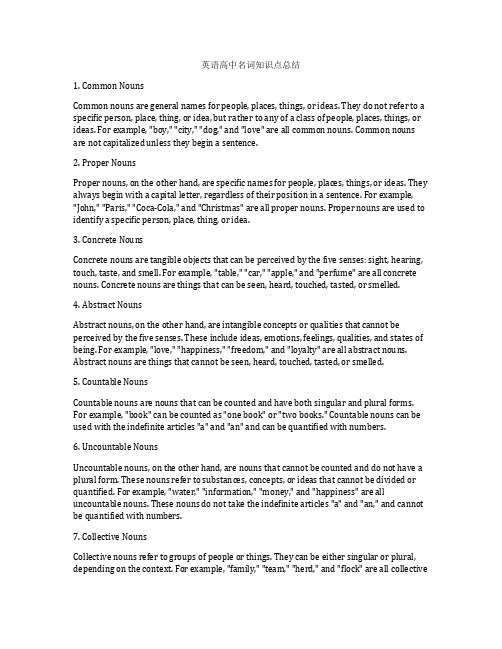
英语高中名词知识点总结1. Common NounsCommon nouns are general names for people, places, things, or ideas. They do not refer to a specific person, place, thing, or idea, but rather to any of a class of people, places, things, or ideas. For example, "boy," "city," "dog," and "love" are all common nouns. Common nouns are not capitalized unless they begin a sentence.2. Proper NounsProper nouns, on the other hand, are specific names for people, places, things, or ideas. They always begin with a capital letter, regardless of their position in a sentence. For example, "John," "Paris," "Coca-Cola," and "Christmas" are all proper nouns. Proper nouns are used to identify a specific person, place, thing, or idea.3. Concrete NounsConcrete nouns are tangible objects that can be perceived by the five senses: sight, hearing, touch, taste, and smell. For example, "table," "car," "apple," and "perfume" are all concrete nouns. Concrete nouns are things that can be seen, heard, touched, tasted, or smelled.4. Abstract NounsAbstract nouns, on the other hand, are intangible concepts or qualities that cannot be perceived by the five senses. These include ideas, emotions, feelings, qualities, and states of being. For example, "love," "happiness," "freedom," and "loyalty" are all abstract nouns. Abstract nouns are things that cannot be seen, heard, touched, tasted, or smelled.5. Countable NounsCountable nouns are nouns that can be counted and have both singular and plural forms. For example, "book" can be counted as "one book" or "two books." Countable nouns can be used with the indefinite articles "a" and "an" and can be quantified with numbers.6. Uncountable NounsUncountable nouns, on the other hand, are nouns that cannot be counted and do not have a plural form. These nouns refer to substances, concepts, or ideas that cannot be divided or quantified. For example, "water," "information," "money," and "happiness" are all uncountable nouns. These nouns do not take the indefinite articles "a" and "an," and cannot be quantified with numbers.7. Collective NounsCollective nouns refer to groups of people or things. They can be either singular or plural, depending on the context. For example, "family," "team," "herd," and "flock" are all collectivenouns. When used as singular nouns, they refer to the group as a whole; when used as plural nouns, they refer to the individual members of the group.8. Compound NounsCompound nouns are nouns that are made up of two or more words. These words can be joined together, hyphenated, or separated, and their meanings may be literal or figurative. For example, "school bus," "seafood," "sports car," and "firefighter" are all compound nouns. Compound nouns can be made up of two nouns, a noun and an adjective, or a noun and a verb.9. Possessive NounsPossessive nouns are used to show ownership or possession. They are formed by adding an apostrophe and "s" ('s) to the end of a singular noun, or just an apostrophe (') to the end of a plural noun. For example, "the boy's hat" and "the children's toys" are both possessive nouns. Possessive nouns are used to indicate that something belongs to someone or something else.10. Plural NounsPlural nouns are used to indicate that there is more than one person, place, thing, or idea. They are formed by adding "-s" or "-es" to the end of a singular noun. For example, "cat" becomes "cats," and "box" becomes "boxes." Plural nouns are used when referring to multiple instances of something.11. Singular NounsSingular nouns are used to indicate that there is only one person, place, thing, or idea. They do not have any added endings or changes to indicate singularity. For example, "dog," "book," "chair," and "love" are all singular nouns. Singular nouns are used when referring toa single instance of something.12. Gender-specific NounsSome nouns are specific to a particular gender, and they change depending on whether they are referring to a male or a female. For example, "actor" becomes "actress" and "waiter" becomes "waitress." Gender-specific nouns are used to indicate the sex of the person or animal being referred to.In conclusion, nouns are a fundamental part of the English language, and understanding their different types and uses is essential for effective communication. By recognizing the different categories of nouns and their functions, students can improve their language skills and expand their vocabulary.。
高中英语语法:名词知识点归纳总结

高中英语语法:名词知识点归纳总结考向一可数名词的复数(1)规则变化注意:①以-o结尾的下列名词要加-es,它们是"黑人英雄在回声中吃土豆、西红柿",即Negroes,heroes,echoes,potatoes,XXX。
但下列以-o结尾的名词既可以加-es,也可以加-s,它们是:zeros(zeroes)零,mosquitos (mosquitoes)蚊子,volcanos(volcanoes)火山。
②以-f或-fe结尾的下列名词需要把f或fe去掉,加-XXX,它们是"为了自己活命,小偷和他的妻子手里拿着刀子和树叶站在架子上,把狼劈成两半",即selves,XXX,XXX,wives,knives,XXX,shelves,wolves,halves。
但下列以-f结尾的名词既可以去掉f加-ves,也可以直接加-s,如:handkerchiefs (XXX)手帕。
③名词前有man或woman修饰,变复数时,作定语的man或woman和后面的名词都要变成复数。
如:XXX(2)不规则变化①常见单复数同形的名词Chinese中国人;sheep绵羊;deer鹿;series系列;means 体式格局;works工场;fish鱼;fruit生果等。
个中fish,fruit 表示种类时,可加复数词尾,即fishes,fruits。
②自身有特殊变化的名词child孩子→XXX男人→XXX→XXX脚,XXX→XXX现象→phenomenamedium传播媒介→media考向二不可数名词具体化(1)通常只用作不可数名词的名词:advice发起,furniture 家具,fun兴趣;information信息,news消息,weather气候,XXX进步,XXX财产,value代价等。
(2)不可数名词具体化①具有某种特性、状态、情感的笼统名词在表示具体的概念时,可以与不定冠词连用,常考的有:XXX make the event a huge success.你的进献一定会使这个变乱很胜利。
高中英语名词考点练习题及讲解

高中英语名词考点练习题及讲解1. 名词的数- 单数名词表示一个,复数名词表示两个或两个以上。
请将下列名词变为复数形式。
- Example: child → children- Exercise: leaf → _______2. 可数名词与不可数名词- 可数名词有明确的复数形式,不可数名词通常没有复数形式,表示数量时需要使用量词。
- Exercise: Choose the correct form to complete the sentence.- A: How many _______ do you want to buy?- B: I want to buy two _______ of milk.- Options: bread / pieces of bread, milk / glasses of milk3. 名词的所有格- 名词的所有格用来表示所有关系,通常在名词后加上's或of。
- Exercise: Fill in the blanks with the correct form of the nouns in possessive case.- The _______ of the school is very beautiful.- Answer: school's4. 专有名词与普通名词- 专有名词指特定的人、地点、机构等,通常首字母大写;普通名词指一类人或事物。
- Exercise: Identify the type of noun in each sentence.- The _______ is the capital of France.- Answer: Paris (专有名词)5. 抽象名词与具体名词- 抽象名词表示抽象概念,如love, freedom;具体名词表示可以触摸或看到的实体,如apple, car。
- Exercise: Match the abstract nouns with their meanings. - a. Courage- b. Patience- c. Ambition- Meanings:- i. The desire to do something difficult or to achieve something.- ii. The ability to wait without becoming annoyed or anxious.- iii. The quality of being brave in difficult situations.6. 名词作定语- 名词可以修饰另一个名词,形成名词短语。
高中英语名词考点

高中英语名词考点名词可以分为专有名词和普通名词,专有名词是某个(些)人,地方,机构等专有的名称,如Beijing,China等。
普通名词是一类人或东西或是一个抽象概念的名词,如:book,sadness等。
普通名词又可分为下面四类:1)个体名词:表示某类人或东西中的个体,如:gun。
2)集体名词:表示若干个个体组成的集合体,如:family。
3)物质名词:表示无法分为个体的实物,如:air。
4)抽象名词:表示动作、状态、品质、感情等抽象概念,如:work。
个体名词和集体名词可以用数目来计算,称为可数名词,物质名词和抽象名词一般无法用数目计算,称为不可数名词。
1.1 名词复数的规则变化情况构成方法读音例词一般加-s 清辅音后读/s/ map-maps浊辅音和元音后读/z/ bag-bags /car-cars以s, sh, ch, x等结尾加-es 读/iz/ bus-buses/ watch-watches以ce, se, ze,等结尾加-s 读/iz/ license-licenses以辅音字母+y结尾变y 为i再加es 读/z/ baby---babies1.2 其它名词复数的规则变化1)以y结尾的专有名词,或元音字母+y 结尾的名词变复数时,直接加s变复数。
例如:two Marys the Henrysmonkey---monkeys holiday---holidays2)以o 结尾的名词,变复数时:a. 加s,如:photo---photos piano---pianosradio---radios zoo---zoos;b. 加es,如:potato--potatoes tomato--tomatoesc. 上述a和b两种方法均可,如zero---zeros / zeroes。
3)以f或fe 结尾的名词变复数时:a. 加s,如:belief---beliefs roof---roofssafe---safes gulf---gulfs;b. 去f,fe 加ves,如:half---halvesknife---knives leaf---leaves wolf---wolveswife---wives life---lives thief---thieves;c. 上述a和b两种方法均可,如handkerchief: handkerchiefs / handkerchieves。
高中英语的名词和冠词

题组训练·冠词填空 1.I earn 10 dollars an hour as a supermarket cashier on Saturdays. 2.The teacher asked us to write an 800-word-long composition. 3.Christmas is a special holiday when the whole family are supposed t o get together. 2.含有不定冠词的常考短语 have a cold得了感冒 have a good time玩得高兴 have a gift for有……的天赋 have a word with与……谈话 have/take a rest休息一下 have a holiday度假 make a living谋生
表语 补语
She is a lovely girl. Everyone elected him monitor.
定语
We will have a meeting on Friday evening.
(二)英语名词作定语的三种形式
作定语的名词往往是说明中心名词的材料、用途、时间、 地点、内容、类别等。作定语的名词有以下三种形式
表示“性质、 able—ability能力
状态”
honest—honesty诚实
后缀
-ance -ence -ancy -ency -age
-ship -dom
-ure
意义
例词
表示“性质、状态或行 accept—acceptance接受
为”
exist—existence存在
expect—expectancy期望
jewelry 珠宝
高中英语名词常考点

名词(noun)考点一、名词的分类:二、名词的数1.可数名词和不可数名词可数名词是表示个体或集体的有单复数之分的名词。
如:apple, horse, shirt不可数名词是表示物品的或抽象概念的名词,没有单复数之分。
如:bread, sugar, news, water, grass, milk, pity, progress,information, advice, furniture, equipment, power, success,failure, baggage/luggage, knowledge,weather, gas ,coffee, music, trouble, wealth, health, work, news, happiness, luck, education,rubbish,2.可数名词的数英语中,表示一本书、一只鸡、一棵树等物质概念时,要用名词的单数形式,要在名词前加a或an。
如:This is a book. It’s an English book. 如果表示两个或两个以上的概念时,要用名词的复数形式。
如:He has two brothers.规则变化:(1).一般在名词后-sdesks worker s(2). 以s, x, sh 或ch结尾的在其后加-esclass es box es wish es watch es 注意:month-months, mouth-mouths(3). 以y结尾的:①元音字母加-y,直接加-s;②辅音字母加-y变y为i加-es①day --day s play—play s monkey--monkey s toy--toy s②baby --babies factory –factories library--libraries dictionary--dictionaries factory--factories century--centuries(4).以0结尾的①无生命的加-s ②有生命的加-es①radio s photo s zoo s radio-radio s piano s kilo s video s zero s bamboo s②potatoes tomato es heroes volcano es(5).以f或fe结尾的,把f或fe变为-vesleaf --lea ves knife—kni ves wife—wi ves shelf-shelves half-halves thief-thieves life-lives self-sel ves 但:roof-roofs不规则变化man, woman, foot tooth, mouse,goose ,phenomenon medium--- men,women, feet, teeth, mice geese ,phenomena media; child ox ---children oxen; sheep fish, deer, species, means--- Sheep fish, deer, species, means ; ①Chinese Japanese②German American③Frenchman Englishwoman---①Chinese Japanese②Germans Americans③Frenchmen Englishwomen3.不可数名词(1)不可数名词一般没有复数形式,并且不能用不定冠词a(an)或数词one, two, three…修饰,但可以用some, any, a lot of等修饰。
高中英语2025届高考语法复习名词知识讲解(名词分类+名词的性+名词的数+名词的格+名词的用法)

高考英语语法复习名词知识讲解一、名词分类1、普通名词:表示一类人、东西或抽象概念的名词。
又可分为个体名词、集体名词、物质名词和抽象名词个体名词——单个(类)的人、物、事等,如:boy,house,tiger等集体名词——有集合、团体含义的词,如:family,team,police等物质名词——无法判断个体的事、物,如:air,snow,bread,rice等抽象名词——表达动作、状态、品质、情感等概念,如:glory,friendship等2、专有名词:表示特定的人或事物名称的词。
(首字母需大写)人名——Tom,Cinderella,Michelle等星期、月份、节日——Sunday,February,the Spring Festival等国家、城市——China,London,Paris等建筑、街道——the Fifth Evenue,Downing Street等3、名词对等语:具有名词性质,通常视为单数。
名词短语——The time of the meeting is not decided yet.不定式——To study abroad is my greatest desire.动名词——Seeing him makes me angry.名词性从句——I know that he has finished the work.The problem is when we can get a pay rise.There is a suggestion that Brown should be dropped from the team.二、名词的性1、阳性:指人类社会中的男性个生或者是动物中的雄性个体。
阳性名词用he,his,him,复数用they来指代。
如:Brother,husband,king,uncle,bull,father等。
例:Tom is a teacher.He works in a primary school.2、阴性:指人类社会中的女性个生或者是动物中的雌性个体。
高中英语知识点归纳名词的复合用法与考点
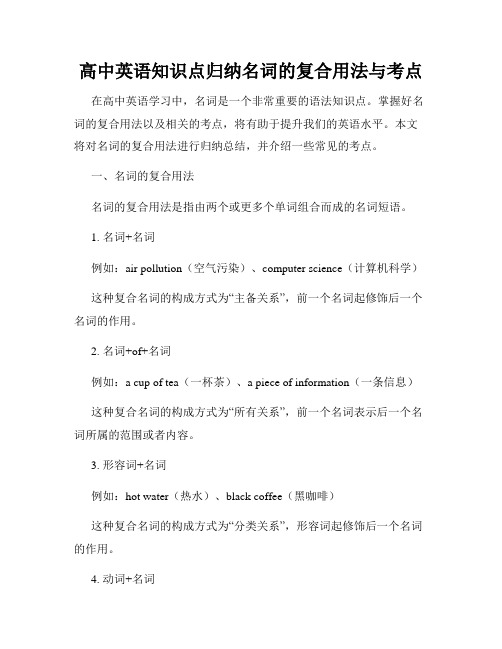
高中英语知识点归纳名词的复合用法与考点在高中英语学习中,名词是一个非常重要的语法知识点。
掌握好名词的复合用法以及相关的考点,将有助于提升我们的英语水平。
本文将对名词的复合用法进行归纳总结,并介绍一些常见的考点。
一、名词的复合用法名词的复合用法是指由两个或更多个单词组合而成的名词短语。
1. 名词+名词例如:air pollution(空气污染)、computer science(计算机科学)这种复合名词的构成方式为“主备关系”,前一个名词起修饰后一个名词的作用。
2. 名词+of+名词例如:a cup of tea(一杯茶)、a piece of information(一条信息)这种复合名词的构成方式为“所有关系”,前一个名词表示后一个名词所属的范围或者内容。
3. 形容词+名词例如:hot water(热水)、black coffee(黑咖啡)这种复合名词的构成方式为“分类关系”,形容词起修饰后一个名词的作用。
4. 动词+名词例如:shopping mall(购物中心)、washing machine(洗衣机)这种复合名词的构成方式为“功能关系”,动词起修饰后一个名词的作用。
二、名词复合用法的考点分析1. 名词复合用法的正确搭配在英语中,名词复合用法有着严格的搭配规则。
我们需要掌握哪些名词可以与其他名词相结合,哪些名词不能相结合。
例如,我们可以说“a cup of tea”(一杯茶),但是不能说“a cup of water of tea”。
正确的搭配与熟练的掌握有助于避免在表达中出现错误。
2. 名词复合用法的变形形式有些名词复合用法会发生变形,需要我们掌握这些变形的规则。
例如,单数名词与复数名词相结合时,复数名词通常放在前面。
例如,“two cups of tea”(两杯茶)。
还有一些名词在复合后会发生变化,需要注意这些规则。
3. 名词复合用法的词性变化在名词复合用法中,有些名词会变成其他词性,例如名词可以变成形容词、动词等。
高中英语语法:名词知识点归纳总结
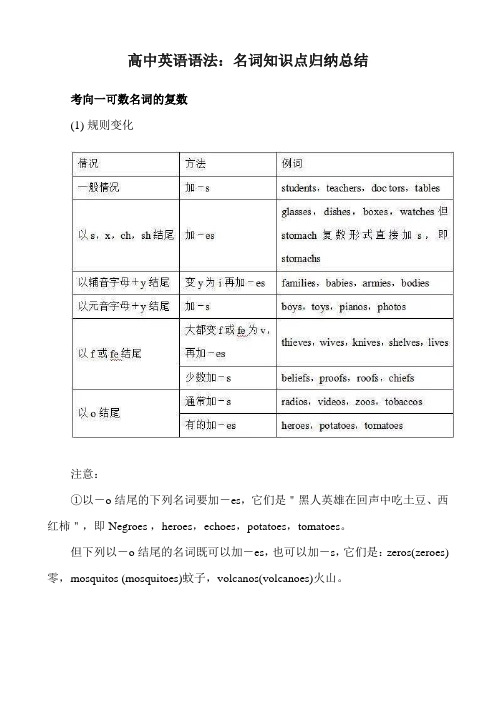
高中英语语法:名词知识点归纳总结考向一可数名词的复数(1) 规则变化注意:①以-o 结尾的下列名词要加-es,它们是"黑人英雄在回声中吃土豆、西红柿",即Negroes ,heroes,echoes,potatoes,tomatoes。
但下列以-o 结尾的名词既可以加-es,也可以加-s,它们是:zeros(zeroes)零,mosquitos (mosquitoes)蚊子,volcanos(volcanoes)火山。
②以-f 或-fe结尾的下列名词需要把f或fe去掉,加-ves,它们是"为了自己活命,小偷和他的妻子手里拿着刀子和树叶站在架子上,把狼劈成两半",即selves,lives,thieves,wives,knives,leaves,shelves,wolves,halves。
但下列以-f 结尾的名词既可以去掉f加-ves,也可以直接加-s,如:handkerchiefs (handkerchieves) 手帕。
③名词前有man 或woman修饰,变复数时,作定语的man 或woman和后面的名词都要变成复数。
如:woman doctor→women doctors(2) 不规则变化①常见单复数同形的名词Chinese 中国人;sheep 绵羊;deer鹿;series 系列;means 方式;works 工厂;fish鱼;fruit 水果等。
其中fish,fruit表示种类时,可加复数词尾,即fishes,fruits。
②自身有特殊变化的名词child 孩子→childrenman男人→mentooth牙→teethfoot脚,英尺→feetmouse 老鼠→micephenomenon现象→phenomenamedium传播媒介→media 考向二不可数名词具体化(1) 通常只用作不可数名词的名词:advice建议, furniture家具, fun乐趣;information信息,news新闻, weather天气, progress进步,wealth财富,value 价值等。
- 1、下载文档前请自行甄别文档内容的完整性,平台不提供额外的编辑、内容补充、找答案等附加服务。
- 2、"仅部分预览"的文档,不可在线预览部分如存在完整性等问题,可反馈申请退款(可完整预览的文档不适用该条件!)。
- 3、如文档侵犯您的权益,请联系客服反馈,我们会尽快为您处理(人工客服工作时间:9:00-18:30)。
高中英语名词考点名词可以分为专有名词和普通名词,专有名词是某个(些)人,地方,机构等专有的名称,如Beijing,China 等。
普通名词是一类人或东西或是一个抽象概念的名词,如:book,sadness等。
普通名词又可分为下面四类:1)个体名词:表示某类人或东西中的个体,如:gun。
2)集体名词:表示若干个个体组成的集合体,如:family。
3)物质名词:表示无法分为个体的实物,如:air。
4)抽象名词:表示动作、状态、品质、感情等抽象概念,如:work。
个体名词和集体名词可以用数目来计算,称为可数名词,物质名词和抽象名词一般无法用数目计算,称为不可数名词。
1.1名词复数的规则变化情况构成方法读音例词一般加-s清辅音后读/s/map-maps浊辅音和元音后读/z/bag-bags/car-cars以s,sh,ch,x等结尾加-es读/iz/bus-buses/watch-watches以ce,se,ze,等结尾加-s读/iz/license-licenses以辅音字母+y结尾变y为i再加es读/z/baby---babies1.2其它名词复数的规则变化1)以y结尾的专有名词,或元音字母+y结尾的名词变复数时,直接加s变复数。
例如:twoMarys theHenrysmonkey---monkeys holiday---holidays2)以o结尾的名词,变复数时:a.加s,如:photo---photos piano---pianosradio---radios zoo---zoos;b.加es,如:potato--potatoes tomato--tomatoesc.上述a和b两种方法均可,如zero---zeros/zeroes。
3)以f或fe结尾的名词变复数时:a.加s,如:belief---beliefs roof---roofssafe---safes gulf---gulfs;b.去f,fe加ves,如:half---halvesknife---knives leaf---leaves wolf---wolveswife---wives life---lives thief---thieves;c.上述a和b两种方法均可,如handkerchief:handkerchiefs/handkerchieves。
1.3名词复数的不规则变化1)child---children foot---feet tooth---teethmouse---mice man---men woman---women注意:由一个词加man或woman构成的合成词,其复数形式也是-men和-women,如anEnglishman,twoEnglishmen。
但German不是合成词,故复数形式为Germans;Bowman是姓,其复数是theBowmans。
2)单复同形,如deer,sheep,fish,Chinese,Japanese,li,jin,yuan,twoli,threemu,fourjin等。
但除人民币的元、角、分外,美元、英镑、法郎等都有复数形式。
如:adollar,twodollars;ameter,twometers。
3)集体名词,以单数形式出现,但实为复数。
例如:people police cattle等本身就是复数,不能说apeople,apolice,acattle,但可以说aperson,apoliceman,aheadofcattle,theEnglish,theBritish,theFrench,theChinese,theJapanese,theSwiss等名词,表示国民总称时,作复数用,如TheChineseareindustriousandbrave. 中国人民是勤劳勇敢的。
4)以s结尾,仍为单数的名词,如:a.maths,politics,physics等学科名词,一般是不可数名词,为单数。
b.news为不可数名词。
c.theUnitedStates,theUnitedNations应视为单数。
TheUnitedNationswasorganizedin1945.联合国是1945年组建起来的。
d.以复数形式出现的书名,剧名,报纸,杂志名,也可视为单数。
例如:\"TheArabianNights\"isaveryinterestingstory-book.《一千零一夜》是一本非常有趣的故事书。
5)表示由两部分构成的东西,如:glasses(眼镜)trousers, clothes等,若表达具体数目,要借助数量词pair(对,双); suit(套);apairofglasses;twopairsoftrousers等。
6)另外还有一些名词,其复数形式有时可表示特别意思,如:goods货物,waters水域,fishes(各种)鱼。
1.4不可数名词量的表示1)物质名词a.当物质名词转化为个体名词时为可数。
比较:Cakeisakindoffood. 蛋糕是一种食物。
(不可数)Thesecakesaresweet. 这些蛋糕很好吃。
(可数)b.当物质名词表示该物质的种类时,可数。
例如:Thisfactoryproducessteel. (不可数)Weneedvarioussteels. (可数)c.当物质名词表示份数时,可数。
例如:Ourcountryisfamousfortea.我国因茶叶而闻名。
Twoteas,please.请来两杯茶。
2)抽象名词表示具体的事例时也可数。
例如:fourfreedoms四大自由thefourmodernizations四个现代化物质名词和抽象名词可以借助单位词表一定的数量,如aglassofwater一杯水/apieceofadvice 一则建议。
5.定语名词的复数名词作定语一般用单数,但也有以下例外。
1)用复数作定语。
例如:sportsmeeting运动会studentsreading-room学生阅览室talkstable谈判桌theforeignlanguagesdepartment外语系2)man,woman,gentleman等作定语时,其单复数以所修饰的名词的单复数而定。
例如:menworkers womenteachers gentlemenofficials3)有些原有s结尾的名词,作定语时,s保留。
例如:goodstrain(货车)armsproduce 武器生产customspapers海关文件clothesbrush衣刷4)数词+名词作定语时,这个名词一般保留单数形式。
例如:two-dozeneggs 两打鸡蛋aten-milewalk十英里路two-hundredtrees两百棵树afive-yearplan. 一个五年计划1.6不同国籍人的单复数国籍总称(谓语用复数)单数复数中国人theChineseaChinesetwoChinese瑞士人theSwissaSwisstwoSwiss澳大利亚人theAustraliansanAustraliantwoAustralians俄国人theRussiansaRussiantwoRussians意大利人theItaliansanItaliantwoItalians法国人theFrenchaFrenchmantwoFrenchmen日本人theJapaneseaJapanesetwoJapanese美国人theAmericansanAmericantwoAmericans印度人theIndiansanIndiantwoIndians加拿大人theCanadiansaCanadiantwoCanadians德国人theGermansaGermantwoGermans英国人theEnglishanEnglishmantwoEnglishmen瑞典人theSwedishaSwedetwoSwedes1.7名词的格英语中有些名词可以加's来表示所有关系,带这种词尾的名词形式称为该名词的所有格,如:ateacher'sbook。
名词所有格的规则如下:1)单数名词词尾加's,复数名词词尾没有s,也要加's,如theboy'sbag男孩的书包,men'sroom男厕所。
2)若名词已有复数词尾-s,只加',如:theworkers'struggle 工人的斗争。
3)凡不能加's的名词,都可以用"名词+of+名词"的结构来表示所有关系,如:thetitleofthesong歌的名字。
4)在表示店铺或教堂的名字或某人的家时,名词所有格的后面常常不出现它所修饰的名词,如:thebarber's 理发店。
5)如果两个名词并列,并且分别有's,则表示"分别有";只有一个's,则表示'共有'。
例如:John'sandMary'srooms(两间)JohnandMary'sroom(一间)6)复合名词或短语,'s加在最后一个词的词尾。
例如:amonthortwo'sabsence名词综合练习题:1.Itwon’tmakemuch________whetheryouagreeornot.A.difficulty??B.trouble??C.difference??D.matter2.Noonehasyetsucceededinexplainingthe________ofhowlifebegan.A.cause??B.problem??C.reason??D.puzzle3.Youmustgettherewithinanhour.Thereshouldbeno___insendingthisinformationtohim.A.question??B.problem??C.quarrel??D.delay4.Ican’tgiveyouthecardwithoutSmith’s________.A.agreement??B.allowing??C.permission??D.Performance5.Whatimpressedmemostwasthattheyneverlost________.A.hearts??B.heart??C.theirheart??D.theirhearts6.ThoughIspoketohimmanytimes,henevertookany________ofwhatIsaid.A.remark??B.observation??C.attention??D.notice7.Iwenttobuya________ofChinaDaily.A.piece??B.sheet??C.lot??D.copy8.ShellyhadpreparedcarefullyforherEnglishexaminationsothatshecouldbesureofpassingitonherfirst________.A.intention??B.purpose??C.attempt??D.desire9.Thereareusuallyatleasttwo________oflookingateveryquestion.A.means??B.directions??C.views??D.ways10.Wehaveworkedouttheplanandnowwemustputitinto________.A.fact??B.reality??C.practice??D.deed11.Sheisyoungforthejob,butontheother________,sheiswelltrained.A.way??B.situation??C.chance??D.hand12.Themostimportant________ofhisspeechwasthatweshouldallworkwhole-heartedlyforthepeople.A.point??B.sense??C.spot??D.view13.---I’dlike________informationaboutthemanagementofyourhotel,please.---Well,youcouldhave________wordwiththemanager.Hemightbehelpful.A.some;a??B.an;some??C.some;some??D.an;a14.Hetoldmehehadbeenofferedaverywell-paid________.A.business??B.service??C.work??D.position15.Eachplayermustobey________,whoistheleaderoftheteam.A.captain??B.acaptain??C.thecaptain??D.captains16.Itwas________thathehadtoaskforhelp.A.suchbigawork??B.asobigjob??C.asobigwork??D.suchabigjob17.Hedroppedthe________andbrokeit.A.cupofcoffee??B.coffee’scupC.cupforcoffee??D.coffeecup18.What________!Wheredidyougetthem?A.bigfish??B.abigfish??C.apieceofbigfish??D.bigafish19.Heleft________withmysecretarythathewouldcallagainintheafternoon.Hesaidhewouldkeep________.A.words;hiswords??B.word;hiswordC.word;word???D.theword;hiswords20.Thenewlawwillcomeinto________onthedayitispassed.A.effect??e??C.service??D.existence21.Weheldapartyin________ofourAustralianteacher,Meggi.A.prize??B.honor??C.praiseD.pride22.---Tom,wi llyouboysplaysoldiersoutside?There’snotenough________foryouboyshere. ---Butwecanplayinthenext________,can’twe?A.places;place??B.room;room??C.rooms;space??D.house;rooms23.---Isthisbridgemadeof________?---Yes,itismadeof2300huge________.A.stone;stone????B.stones;stonesC.stone;stones???D.stones;stone24.---Mum,I’mgoingtovisitmyaunt.Whataboutaweek?---Aweekistoolong.Trytobebackina________ofdays.A.number??B.dozen??C.few??D.couple25.Mrs.Greentriedhardtofindajobbutshehadno________.A.luck??B.time??C.hope??D.chance26.Hisdaughterisalwaysshyin________andsheneverdarestomakeaspeechto________.A.thepublic;thepublic??B.public;thepublicC.thepublic;public???D.public;public27.Fast-foodrestaurantsare________tousall.A.ofmanyhelps???B.agreathelpC.greathelps????D.muchhelp28.Theseyoungpeoplearenowmakinganactive________tobeautify(美化)ourcity.A.part??B.effort???C.decision???D.plan29.---WhatyoulikemaynotbewhatIlike.---Yes,oneman’smealisanotherman’s________.A.poison???B.medicine???C.meal???D.food30.Hesaidthattwo________wouldcometoourschoolthenextday.A.womanscientist???B.womenscientistC.womanscientists???D.womenscientists31.My________all________hardforthepeople.A.family;work?????B.family;worksC.families;work???D.families;works32.Dr.Jonesordered________forthelaboratory.A.twoequipments????B.twopiecesofequipmentsC.twopiecesofequipment??D.twoequipmentpieces33.---Wherehaveyoubeen?---I’vebeento________.A.theTurners????B.theTurner'sC.Mr.Turners'????D.theTurners'34.Manychildrenhavetoseethefilmsfor________.A.grown-up?????B.growns-upC.grown-ups????D.growns-ups35.Itoldaboutsomeoftheterrible________Ihadhadinthewar.A.experience????B.experiencesC.experiencing????D.experiencedthings36.Thetableisonly________high.A.two-foot????B.twofootC.two-feet????D.twofeet37.ThesedaysIemployedtwo________inmyhouse.A.man-servants???B.men-servantC.man-servant???D.men-servants38.That's________.A.JamesandCharlesfather???B.JamesandCharles'sfatherC.James'sandCharles'sfather??D.James'sandCharlesfather39.________ispublisheddaily.A.Time??B.Times???C.TheTime???D.TheTimes40.Therearemany________inbig________.diesdriver;citys???dydrivers;citiesdiesdrivers,cities???diesdriver;city。
